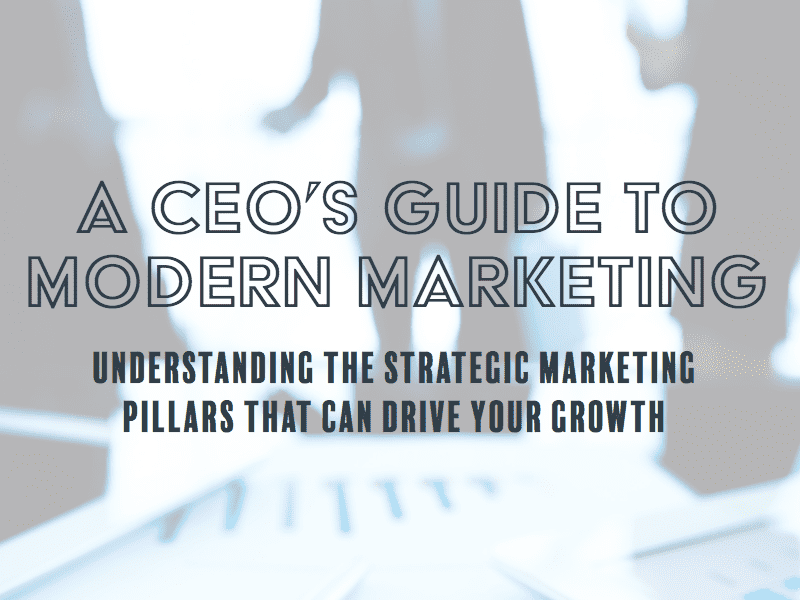3 Questions to Kick-Start Your Manufacturing Company Marketing Plan
Making sure marketing is earning money for your manufacturing company is always easier said than done, especially if you decide to take it into your own hands. There are so many moving parts, and it takes years of experience to build a strong marketing strategy.
For beginners, getting started can be as easy as answering a few questions. But don’t feel pressured to have all the right answers today. Instead, use these three specific questions to guide you in setting priorities moving forward. You should also get a feel for how big of an undertaking your marketing goals really are. Start here:
1. Where do you want to go?
The first and most important aspect of marketing is having clear goals—because it’s marketing’s job to map out how you’ll achieve them. You might already have goals outlined: What do you want to accomplish? What resources are you willing to invest to get there? There are a ton of options for where to focus your attention first, but many manufacturing companies fall somewhere under the following options:
Goal: Grow the Customer Base (New Buyers, Same Market)
An obvious choice—growing the customer base means finding new buyers in your existing market. To make that happen, you’ll need to get more strategic with marketing outreach. Improved marketing plans will target buyers based on their needs and guide their journey from discovery to purchase. Market research will determine potential buying sectors that you haven’t yet targeted and provide you plan to reach them.
Goal: Cross-Sell and Upsell (Same Buyers, Same Market)
To become a master of cross-selling and upselling, you’ll show existing customers your offerings they’re not using yet. This also takes strategic remarketing. Your current customers already know your business, but they may not be familiar with all your services. Use those existing relationships to build trust and continue the conversation about how you can help them in other ways.
Goal: Enter a New Market (New Buyers, New Market)
If you’re expanding products or services into a new market, you need a solid understanding of the marketplace and your spot within it. Marketing’s job is to research the playing field and draw a unique connection between you and potential buyers. That connection comes from the right messaging, branding, and materials in the right place at the right time.
For each of these goals, marketing communicates your unique traits to a target audience before they even start the buying process, ultimately driving the results you want. As with almost all aspects of a company, it’s not a matter of if you should do the thing, it’s a matter of how you’re going to do it.

2. What sets your manufacturing company apart?
Have you uncovered what exactly sets you apart from your competition, and what will ultimately make a customer choose you over someone else? Every company has unique offerings or services that stand out. It’s up to you to showcase what clients get from you that they can’t get anywhere else. For manufacturing companies specifically, you have to give customers the opportunity to connect with your brand. Give them a feel for what your company stands for and why. What do you care about? How do your services help? Remember to keep that connection throughout the customer journey.
The customer journey is the crux of modern marketing. It’s the path someone takes from researching their problem and finding your page, to learning about your services, and contacting you for help. That journey should reflect your personality the whole way through.
For example, Fres-co System USA’s website has photos that show employees at work, bringing their packaging offerings to life – literally putting a face to the name. This accomplishes a few things: 1) It makes the website look fresh, with colorful photos and clean lines, 2) Photos aren’t common across manufacturer websites, so this one stands out and sticks in your mind, and 3) It speeds up the connection prospects feel with providers. Showing employees at work creates a quick familiarity that makes the process a bit smoother.
That brand promise is carried throughout the website, in content and email communications, and in real conversations you’ll have with their team. They’ve capitalized on just being themselves, and it’s paid off in creating a better customer journey. When people decide to buy from Fres-co, they’re buying into the promise that people-first branding makes.
Wondering which differentiating aspect to focus on? Try these categories:
| Common | Uncommon |
| Products and Services Customer Base Objective or Mission Employees and Leadership Team | Beliefs Location Partnerships History |
3. Who’s going to get you there?
If you don’t have a full-blown marketing department at your company, then you’re not alone. Many manufacturing companies lean more heavily on sales teams to bring in new business and maintain customer relationships. They forget how crucial marketing is, and how much of a weight it can lift off sales. But there’s a ton of legwork that needs to be done before you’re in the swing of things. Thankfully, there are a few options for tackling that legwork: from full-time employees to third-party partners that help along the way. Here’s a look at each option’s pros and cons:
- Internal Marketing Department
- Pro: Dedicated in-house resource that lives and breathes your brand
- Con: Expensive, and hires may lack industry or marketing experience, requiring more hands-on management and better hiring strategy
- Sales Team
- Pro: They know your brand inside and out, structure is already in place
- Con: Not strategically positioned, focused on closing individual sales, and largely rely on referrals and cold outreach without scalable lead gen
- Marketing Agency or Freelancers
- Pro: Can hire as needed, covers lots of specialties
- Con: Time-consuming to manage the relationship, typically output or project-focused without strategic leadership, can be expensive without measurable returns
- Fractional CMO or Strategic Marketing Consultant
- Pro: Experienced, part-time resource that combines executive leadership with tactical execution, oversees marketing function as needed
- Con: Not in-house, requires more virtual communication, may have a specialty outside of the business, effectiveness can be limited by lack of in-house resources
Your company’s priorities, goals, and budget will determine which option you choose. Remember that successful manufacturing company marketing needs a clear, realistic strategy and people who know how to make it happen. Strategic marketing consultants are experts at this, and Marketri’s fractional CMO services bring the right balance of expertise, executive-level leadership, and tactical execution to put your marketing plans into action. Trust a team that knows your business, market, and where you want to be. That’s the best way to grow.






